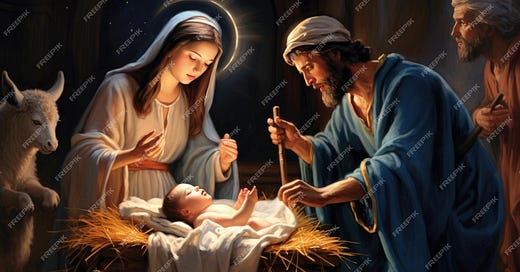With a contemporary lexicon, John’s creation story given at the beginning of his gospel seems perplexing. It opens with these famous words:
“In the beginning was the Word, and the Word was with God, and the Word was God.” (John 1:1)
What exactly is this “word” spoken of in this gospel? What is the significance of this “word” taking on flesh, as John writes later in this chapter.
The word “word” is the koine Greek term λόγος (logos). It is difficult to pin down a precise meaning for this term, as it has no direct English equivalent. Depending on the context, it may be rendered as “logic”, “wisdom”, or “word.” The term was popularized by the presocratic philosopher Heraclitus who described it simply as that “orders the world.” We moderns take for granted the order of the world, in an era where science has achieved great feats that would have seemed impossible to a prior generation.
To the ancients, the existence of the logos was obvious. What exactly it was proved to be a much more difficult question. Philo of Alexandria thought the logos was not itself God, but the first creation of God, through whom he created the world. To many of the ancients, God creating the material world directly would have seemed to be a great impiety.
The Christian conception of the incarnation turned all of this on its head, clarifying earlier philosophical intuitions. The opening to John’s gospel reads:
“In the beginning was the Word, and the Word was with God, and the Word was God. The same was in the beginning with God. All things were made by him: and without him was made nothing that was made. In him was life, and the life was the light of men. And the light shineth in darkness, and the darkness did not comprehend it.
There was a man sent from God, whose name was John. This man came for a witness, to give testimony of the light, that all men might believe through him. He was not the light, but was to give testimony of the light. That was the true light, which enlighteneth every man that cometh into this world. He was in the world, and the world was made by him, and the world knew him not.” (John 1:1-10)
St. John identifies the logos both as equal to God and being God. This paradox results in the formulation of the Trinity that Christians adhere to today. It is a mystery, not unintelligible, but infinitely intelligible. We find the Philo was right in attributing to the logos the creation of the world, but incorrect in rejecting his divinity. St. John not only attributes to the logos the creation of the world, but also the illumination of the human race by describing him as the “light of men.” It is through the logos that the world was created and through the same logos we come to know truths about the world.
St. Augustine of Hippo defines the word that which give formation to the world and allows mankind to possess ideas about the world. He gives his definition of the word in the Catena Aurea, a commentary of the Church fathers on the gospels:
“The Word of God is a Form, not a formation, but the Form of all forms, a Form unchangeable, removed form accident, from failure, from time, from space, surpassing all things, and existing in all things as a kind of foundation underneath, and summit above them.”
St. Augustine inherits parts of his theory of forms from Plato, and attributes to the logos the creation, existence, and intelligibility of the world. He also describes the logos as something transcending our knowledge and beyond our direct comprehension.
From the definitions given, we see certain disagreements, but a general conception of the logos given by the philosophers in antiquity. There is however, one claim unique to the other conceptions of the logos discussed thus far. John’s gospel then goes on to claim, “The Word (logos) was made flesh, and dwelt among us” (John 1:14). This is referring to the birth and life of Jesus Christ. The Christian claim, is that the very co-creator of the universe, had become truly man, whilst at the same time remaining truly God, in an attempt to save the human race from its iniquity.
Catholics profess that Jesus Christ is not one wise man, or even the wisest of man, but eternal wisdom as living flesh. He did not leave pagan wisdom in ruins, but perfected and clarified it, while showing it’s sheer futility with respect to redeeming the human race.
This Christmas, we do not celebrate the birth of a great man of history, but the birth of God-incarnate. We recall how, in the words of St. Athanasius, “God became man so that man could become (like) God.”




